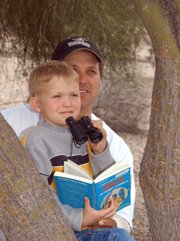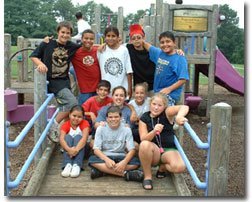
Tuesday, April 28, 2009

- Full fuel tank(s)
- Bell or whistle or horn, as required
- Working lights, as required
- At least one working flashlight
- Completed safety check for leaks, boat plug in
- Fuel lines and tank checked for leaks
- Suitable weather and water conditions
- Properly stored and secured gear and supplies
- A Coast Guard approved, wearable PFD that is properly sized and in good condition for each person on board. On boats 16 feet and over, an additional throwable device is required.
- Approved, full-charge fire extinguisher(s) for motorboats
- Paddles or oars
- The boat's Certificate of Number LI Anchor and anchor line LI Tool kit and spare parts
- Any needed charts, tide tables, current tables, navigation equipment
- Boat shoes on all deck hands
- Motor in good operating condition
- Propeller in good condition with lower unit free of weeds and debris
- Passengers seated and briefed on emergency procedures; their PFDs checked for fit
- Your boating plans known by a responsible person ashore
Posted by Futurecamping
| Post a Comment
|
0
comments
|
![]()
Things To Be Taken While Hiking
Sunday, April 26, 2009

Backcountry camping
- Plenty of water (and purification tablets or filters for the backcountry)
- Small first aid kit (bandages for blisters)
- Sunscreen
- Insect repellant
- Basic survival kit with matches, signal mirror, etc.
- High energy food
- A whistle
- Rain gear and other seasonal weather clothing
Posted by Futurecamping
| Post a Comment
|
0
comments
|
![]()
Exercise Is The Best Way To Live A Long Healthy Life
Tuesday, April 21, 2009

Activity ideas for older adults
There are hundreds of enjoyable physical activities you can do.
The trick is to find ones that appeal to you. As a starting point, here are some of the most popular and readily available forms of exercise for older adults.
- Walking is the most natural exercise of all and fits in with almost everyone's lifestyle.
- Gentle exercise classes provide great opportunities for social interaction and support.
- Swimming is a good all round exercise and a great way to get fit.
- Aqua aerobics is a group exercise class done in water and is very popular with older adults.
- Golf is very good for stamina and leg strength if played regularly.
- Weight training helps to keep bones and muscles strong.
- Tai Chi is a martial arts form of exercise combining a physical workout, relaxation and skilled learning.
- Gardening provides hours of enjoyment while improving your strength, flexibility and suppleness.
Source: https://www.dsr.nsw.gov.au/
Posted by Futurecamping
| Post a Comment
|
0
comments
|
![]()
Outdoor Camping And Drinking Water
Friday, April 17, 2009

Don't wait until you feel thirsty to drink water; the human body needs fluids on a regular basis. An adult should drink about two liters of water each day (that's about eight, 8-ounce glasses) to stay hydrated. In extreme temperatures, two to four 8-ounce glasses of fluid an hour will help keep you hydrated and decrease the risks for heat exhaustion or heat stroke.
Dehydration occurs when the body loses water faster than it should. During times of extreme heat or extreme exertion, be alert for signs of dehydration. Symptoms include a decrease in urination, a dry mouth and throat, and feeling dizzy when standing up. Young children and babies show similar symptoms if dehydrated; additionally, a dehydrated child may cry without tears and exhibit unusual drowsiness or fussiness.
Outdoor Activities And Thirst
Sometimes it's easy to underestimate the weather and think that you won't become too hot during a walk to the bus stop or a jog around the track. But during most summer days, you need a bottle of water on the sidelines when you and your family or friends are running around playing soccer, chasing Frisbees, or mowing the lawn. Whatever your outdoor activity, have water on hand to satisfy your thirst and decrease the chances of dehydration.
Wondering how to quench your thirst? Drink water! Avoid beverages with alcohol and drinks high in sugar since they don't fight dehydration and can make symptoms worse. Stay away from caffeinated and carbonated beverages when you feel thirsty. Sports drinks may be appropriate when you're physically active but remember that they have high levels of sugar, salt, and potassium.
Drinking Water And Camping And Hiking Trips
If you're enjoying the great outdoors on a hiking or camping trip, you have options: bring drinking water with you or be prepared to purify your own water from a lake, stream, or river. If you plan on drinking water from a natural source, be sure to boil or filter and chemically treat the water (for general guidelines, see "Treatment of Drinking Water"). Even though fresh water from a stream or river looks clean, it may contain germs that can make you sick. If you're planning a day trip hiking through the woods, bring drinking water with you. It's a great way to keep hydrated and is easy to carry. Be sure to have enough drinking water on hand to keep everyone in your group hydrated.
Keep Hydrated; Keep Safe
Playing ball, hiking a trail, or flying to a distant land, you'll need water to drink. Wherever you get your drinking water (a private well, a public water system, or a stream next to your camping site), it's important to know that it's clean, because clean means free of germs that can cause water-related illnesses. Take the necessary precautions before you drink: check with your water supplier and make sure it is following the state standards concerning clean water, drink commercially-bottled water if reliable safe tap water is unavailable, and purify water from a lake, river, or stream.
Posted by Futurecamping
| Post a Comment
|
0
comments
|
![]()
Develope Your Child's Confidence
Tuesday, April 14, 2009

Their fears might seem trivial to adults, but to a child these are very real. Will I be sad because I miss Mum and Dad too much? What will the food be like? Will the other kids like me? Will it be scary? Who is going to look after me if I'm sick or unhappy?
"A Kids Holiday Camp at one of our Centres is a tremendous opportunity for children," says Robert Ridley from NSW Sport and Recreation. "Coming to camp is in many ways a rite of passage, a chance to take steps into the bigger world. Going to camp is a great way for kids to build independence, develop self-esteem, learn about teamwork, make new friends and try different activities and experiences."
Qualified holiday staff are able to help kids discover hidden talents or aptitudes which often lead to positive life-changing experiences that affect all areas of their lives. Children receive the best instruction and supervision when they take part in fun, adventurous activities such as canoeing or abseiling. Most importantly, they are properly cared for and supported at all other times during the camp. The welfare of campers is paramount.
"To do this, our highly trained instructors deliver the adventurous activities, while our camp counsellors, who are the constant companions of campers, provide the social, emotional and physical support that helps kids to feel relaxed, safe and accepted for their whole stay at camp," says Mr Ridley.
From mealtimes to activities and with their fellow campers in their dormitories, Camp Counsellors are looking after the wellbeing of the group and the individuals that make up the group. They are the child's go to person when at camp. Their role is to make sure that children feel safe within the group.
For example, some parents worry about homesickness and how their child will cope without them. Robert Ridley says staff at NSW Sport and Recreation Centres are trained to recognise the symptoms and intervene with a range of measures to make sure the child is treated respectfully and with empathy.
"We know that being homesick is a very natural feeling. Unfortunately many children think homesickness is a weakness, something to be ashamed of," says Mr Ridley. "It's not something we dismiss lightly and every situation requires careful and considerate management. When children realise that their friends feel or have felt the same way, it helps them understand what a natural thing homesickness is. You mean you get homesick too? Many children find this to be a huge relief and are then able to focus more on the positive and enjoyable activities camp offers."
To help a child prepare for camp, it's a good idea for parents and carers to talk to them about their expectations, fears, and how they feel about being away from home. Sending a child to camp with a friend with whom they can share their experiences is another possibility.
Posted by Futurecamping
| Post a Comment
|
0
comments
|
![]()
Thursday, April 9, 2009

Watching wildlife is a lifelong learning experience. It can begin at any age and everyone can participate.
Arizona provides some of the best wildlife viewing opportunities in the nation, with more than 900 animal species and 50 million public acres of natural land to explore. So, you are bound to witness some spectacular sights in Arizona's varied landscapes if you know where and when to look, what to look for, and how to look for wildlife in any givenhabitat.
What is wildlife viewing?
Wildlife viewing is the activity of watching and enjoying wildlife species in their natural environment. The activity may be as simple as observing a backyard bird feeder, or as adventurous as a moonlit hike through a canyon to watch nocturnal animals scurry about under the cover of dark. It is also called watchable wildlife.
Why watch wildlife?

- It can provide a fun and inexpensive activity for the entire family to enjoy together.
- It is a relaxing experience that provides a reconnection to nature.
- Observers can gain a better understanding of how wildlife acts in their natural environment, including how they forage for food, where they live and their interactions with other wildlife.
- Seeing wildlife can leave a viewer with a positive, unforgettable, and personal experience that they will recall for years to come.
- Wildlife viewing experiences can help inspire conservation efforts to benefit wildlife.
- Wildlife viewing provided more than $825 million in 2006 to Arizona and its communities.
- It benefits wildlife through a heightened public awareness of the value of wildlife and habitat, and the need to conserve irreplaceable assets.
Posted by Futurecamping
| Post a Comment
|
0
comments
|
![]()
Tuesday, April 7, 2009

Posted by Futurecamping
| Post a Comment
|
0
comments
|
![]()
Friday, April 3, 2009

Posted by Futurecamping
| Post a Comment
|
0
comments
|
![]()
Tips On Choosing An Appropriate Summer Camp For Your Children
Wednesday, April 1, 2009
- Is summer camp what I really want for my child?
- Do I want it to be close to home or work?
- Do the hours fit my schedule?
- Would I feel comfortable leaving my child there?
- Can I afford it?
Getting Started
- Ask the operator of the camp you are interested in if he or she has applied for a permit from the New York City Department of Health and Mental Hygiene.
- Get referrals from other parents, friends or relatives who have had experience with a particular camp.
- Use this website or request a copy of the Department's summer camp directory to find a conveniently located camp.
- Visit different campsites and speak with different camp directors to determine which one most closely meets your child's needs.
- Choose a program that fosters a healthy and safe environment, while providing a variety of recreational activities.
Posted by Futurecamping
| Post a Comment
|
0
comments
|
![]()